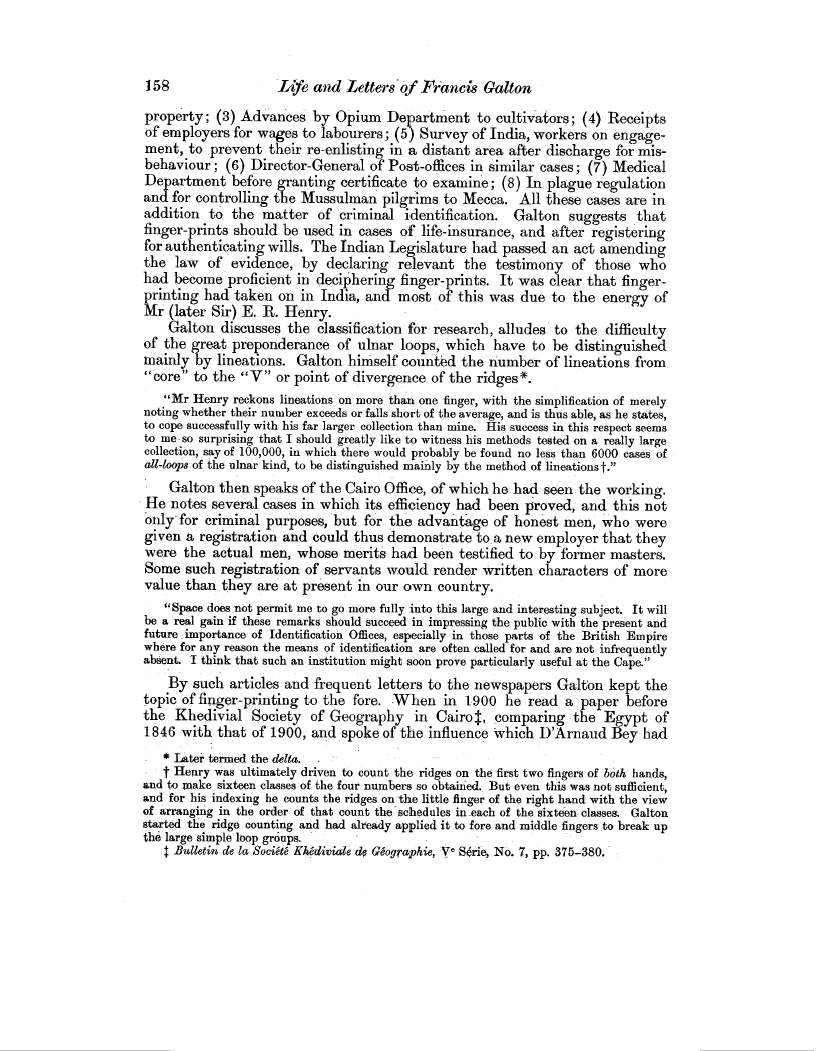| ||||||

OCR Rendition - approximate
158 Life and Letters of Francis Galton property; (3) Advances by Opium De artment to cultivators; (4) Receipts of employers for wages to labourers; (5) Survey of India, workers on engagement, to prevent their re-enlisting in a distant area after discharge for misbehaviour; (6) Director-General of Post-offices in similar cases; (7) Medical Department before granting certificate to examine; (8) In plague regulation and for controlling the Mussulman pilgrims to Mecca. All these cases are in addition to the matter of criminal identification. Galton suggests that finger-prints should be used in cases of life-insurance, and after registering for authenticating wills. The Indian Legislature had passed an act amending the law of evidence, by declaring relevant the testimony of those who had become proficient in deciphering finger-prints. It was clear that fingerprinting had taken on in India, and most of this was due to the energy of Mr (later Sir) E. R. Henry. Galton discusses the classification for research, alludes to the difficulty of the great preponderance of ulnar loops, which have to be distinguished mainly by lineations. Galton himself counted the number of lineations from "core" to the "V" or point of divergence of the ridges*. "Mr Henry reckons lineations on more than one finger, with the simplification of merely noting whether their number exceeds or falls short of the average, and is thus able, as he states, to cope successfully with his far larger collection than mine. His success in this respect seems to me-so surprising that I should greatly like to witness his methods tested on a really large collection, say of 100,000, in which there would probably be found no less than 6000 cases of cell-loops of the ulnar kind, to be distinguished mainly by the method of lineations t." Galton then speaks of the Cairo Office, of which he had seen the working. He notes several cases in which its efficiency had been proved, and this not only for criminal purposes, but for the advantage of honest men, who were given a registration and could thus demonstrate to a new employer that they were the actual men, whose merits had been testified to by former masters. Some such registration of servants would render written characters of more value than they are at present in our own country. "Space does not permit me to go more fully into this large and interesting subject. It will be a real gain if these remarks should succeed in impressing the public with the present and future importance of Identification Offices, especially in those parts of the British Empire where for any reason the means of identification are often called for and are not infrequently absent. 'I think that such an institution might soon prove particularly useful at the Cape." By such articles and frequent letters to the newspapers Galton kept the topic of finger-printing to the fore. When in 1900 he read a paper before the Khedivial Society of Geography in Cairot, comparing the Egypt of 1846 with that of 1900, and spoke of the influence which D'Arnaud Bey had * Later termed the delta. t Henry was ultimately driven to count the ridges on the first two fingers of both hands, and to make sixteen classes of the four numbers so obtained. But even this was not sufficient, and for his indexing he counts the ridges on the little finger of the right hand with the view of arranging in the order of that count the -schedules in each of the sixteen classes. Galton started the ridge counting and had already applied it to fore and middle fingers to break up the large simple loop groups. I Bulletin de la Societe Kkediviale de Geographie, Ve Serie, No. 7, pp. 375-380.
|